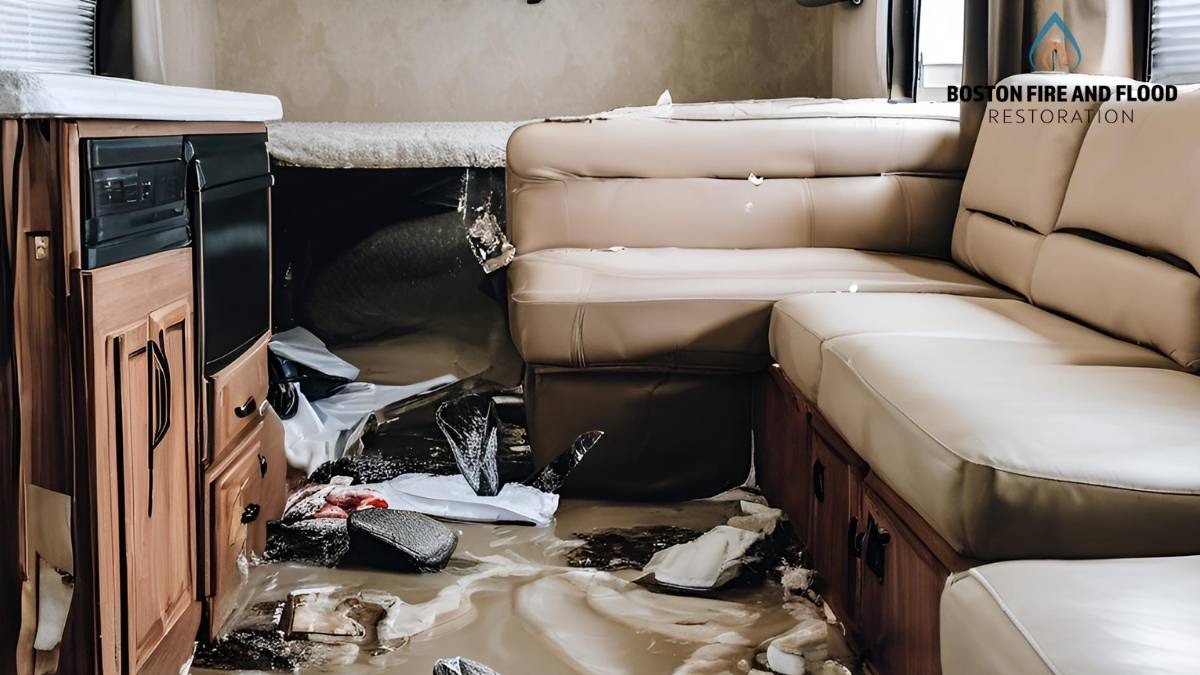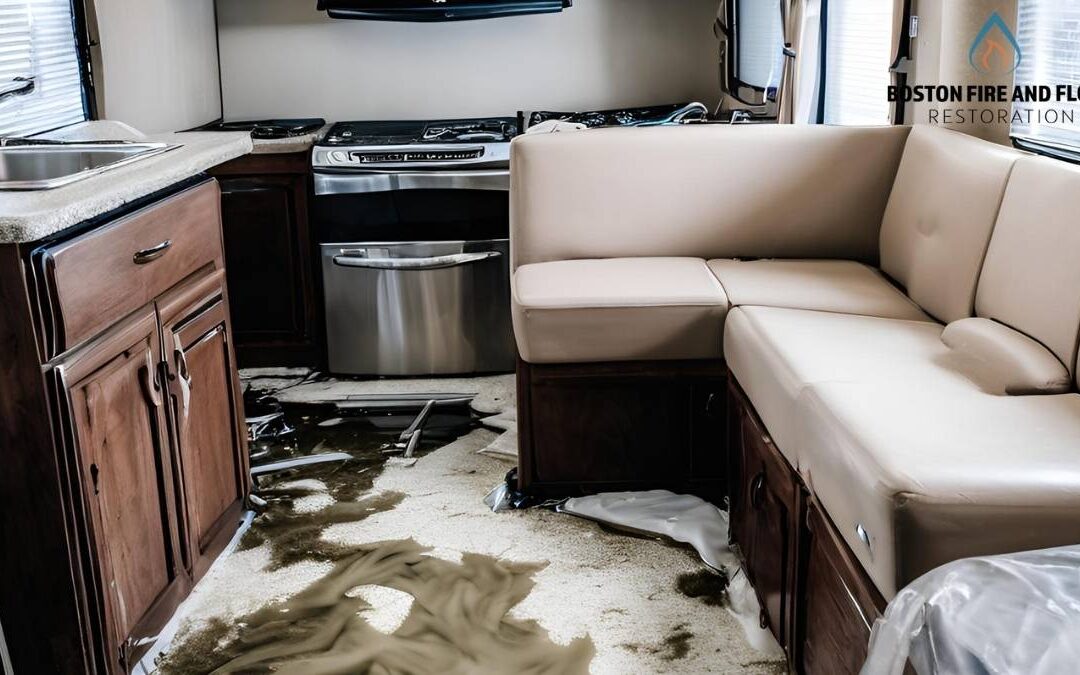RV adventures bring freedom and excitement, but unexpected water damage can quickly turn your dream trip into a costly headache. From leaky roofs to burst pipes, water damage in your RV can be expensive to fix. One of the most common questions RV owners ask is: Does insurance cover RV water damage? Let’s explore what you need to know to protect your RV and your peace of mind with insights from Boston Fire and Flood Restoration, your expert in water damage repair.
Understanding RV Insurance Coverage
RV insurance, much like auto or home insurance, provides a sense of security for your RV as both a vehicle and a living space. This comprehensive coverage offers protection for various types of damage, including water damage, under specific conditions. However, the extent of your coverage for water damage is determined by the circumstances of the damage and the details of your policy.
It’s important to note that not all water damage claims are automatically covered. The type of water damage, its cause, and the specifics of your policy all play a significant role in determining whether you’re protected. To avoid any surprises, it’s crucial to regularly inspect and maintain your RV, a proactive step that can prevent potential water damage issues.
Types of Water Damage Covered by RV Insurance
RV insurance may cover water damage under certain conditions. Here’s a closer look at when your policy might come to the rescue:
1. Sudden and Accidental Water Damage
If the water damage is due to a sudden and accidental event, like a burst pipe, most RV insurance policies will cover the repair costs. For example, if a water line freezes and bursts while you’re camping, you can likely file a claim.
Tip: Always check the “comprehensive coverage” part of your policy to see what’s included. If you need expert water damage restoration, Boston Fire and Flood Restoration is here to help.
2. Damage from Weather Events
Water damage from storms, floods, or heavy rain might be covered, but it depends on your insurance. Comprehensive RV insurance usually protects against natural disasters, but some policies may need extra coverage for flooding.
3. Water Damage Due to Roof Leaks
Many RV owners face water damage from roof leaks. If a leak happens because of sudden damage, like a tree branch falling on the roof, your insurance might cover it. However, leaks that happen over time because of poor maintenance often aren’t included.
Tip: Regularly inspect and maintain your RV’s roof to avoid costly repairs and claim denials. For quick and effective water damage repairs, reach out to Boston Fire and Flood Restoration.
Insurers often deny claims for water damage that they see as preventable through regular maintenance.
When Is Water Damage Not Covered?
1. Gradual Damage Due to Poor Maintenance
One of the biggest misunderstandings about RV insurance is thinking it covers slow leaks. If your RV develops a slow leak that gets worse over time, insurance companies usually won’t cover it. Why? Because it’s seen as a maintenance issue. Regular inspections and repairs are essential to prevent gradual damage.
2. Pre-Existing Water Damage
If the water damage was already there before you bought the policy, or if the issue existed when you purchased the RV, it won’t be covered. Insurers expect any pre-existing problems to be disclosed before they agree to insure your RV.
3. Mold and Mildew
Mold and mildew often grow from ongoing moisture problems. Some policies might cover mold if it’s from a sudden, covered event (like a burst pipe), but most won’t cover it if it’s due to long-term moisture issues. Always review your policy’s exclusions to understand what isn’t included.
Regular maintenance and early detection are essential to avoid problems that could lead to denied claims. If you’re facing mold issues, Boston Fire and Flood Restoration offer thorough mold remediation services to keep your RV safe.

Water Damage
How to File an Insurance Claim for RV Water Damage
If your RV has sudden water damage, filing a claim is the next step. Follow these simple steps to improve your chances of a successful claim:
Step 1: Document the Damage
Take clear photos and videos of the water damage. Document everything, from the visible damage to the cause of the problem, if known. Good documentation can support your claim.
Step 2: Contact Your Insurance Company
Report the damage as soon as possible. Delays can lead to complications or even claim denials. Be clear and detailed about how the water damage happened.
Step 3: Provide Maintenance Records
If the damage is related to an area you’ve maintained (like the roof), provide records of your maintenance efforts. This shows your insurer that you’ve tried to prevent the damage.
Honesty and thoroughness are crucial when filing an insurance claim for RV water damage. For professional guidance and repair services, Boston Fire and Flood Restoration is ready to assist.
How to Prevent Water Damage in Your RV
1. Regular Roof Inspections
Inspect your RV’s roof before and after long trips. Look for cracks, tears, or signs of wear that could let water in. Sealing these areas quickly can save you a lot of money.
2. Check Seals and Windows
Check window seals, slide-out seals, and door frames regularly. Replace or repair any that are worn or damaged. Even small gaps can lead to significant water damage over time.
3. Keep an Eye on the Plumbing
RV plumbing can leak, especially in freezing weather. Insulate pipes and regularly check under sinks and around plumbing fixtures for leaks or signs of water.
Preventive maintenance tips from Boston Fire and Flood Restoration can help keep your RV in top shape, reducing the risk of water damage.
FAQs: Does Insurance Cover RV Water Damage?
1. Does Comprehensive RV Insurance Cover Water Damage?
Yes, but only if the water damage is sudden and accidental. Gradual damage caused by neglect is usually not covered.
2. How Can I Tell If My Policy Covers Flood Damage?
Check the comprehensive coverage part of your policy or ask your insurance provider directly. Some policies may need extra coverage for floods.
3. Can I Add Coverage for Mold and Mildew?
Some insurers offer add-ons or extra coverage for mold damage, but they can be pricey. It’s best to maintain your RV well to avoid these issues altogether.
Conclusion
So, does insurance cover RV water damage? It depends on the situation. Sudden and accidental water damage, like a burst pipe or storm, may be covered, but gradual issues due to poor maintenance likely won’t be. Understanding your RV insurance policy is vital, and regular maintenance can help prevent unexpected repairs and claim denials.
Need help with water damage repair or mold remediation? Contact Boston Fire and Flood Restoration today for expert advice and support! We’re here to help you protect your RV and keep it in top shape.

